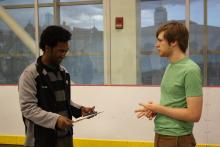
— Professor Tom Kochan, George M. Bunker Professor of Management, MIT
"There are many paths to success and virtually all of them require the kinds of skills you are providing in the Gordon-MIT Engineering Leadership Program."
— MIT Professor Edmund Bertschinger (Physics)
"In my freshmen seminar, we have traditionally handled "teamwork teaching" in an ad hoc way, applauding good results and working to correct problems as they arose. The Gordon Teamwork module is a real step up, providing a logical framework for engaging the students in developing good teamwork practices that deliver real results in the laboratory without distracting from the technical learning in class. I'm very pleased and I will definitely keep the module in my quiver for future terms."
— Professor Steven B. Leeb (EECS & MechE), MacVicar Faculty Fellow
"I'm writing to thank you for the team training you conducted in 10.10. Our project is now finished, and I'm very pleased to say that the number of complaints I received about team troubles was less than a quarter of last year's. Furthermore, the majority of those cases appeared to be resolved by the mechanisms in place due to your team training. I appreciate the flexibility you showed in adapting to our schedule and constraints, and thank you for a meaningful contribution to our class."
— Barry S. Johnston, Senior Lecturer and Undergraduate Officer, Department of Chemical Engineering
"This is not a great program. IT IS AN AWESOME PROGRAM. Would love to see more Course 3'ers involved."
— Edwin L. (Ned) Thomas, Former MIT Dept Head (Materials Science and Engineering); Current Dean of Engineering at Rice University
In its report The Engineer of 2020: Visions of Engineering in the New Century, the National Academy of Engineering outlined the various fields in which students educated in engineering might go on to be leaders, including research, product and system development, business and even broader professions. The NAE concludes that:
"In preparation for this opportunity, engineers must understand the principles of leadership and be able to practice them in growing proportions as their careers advance. Complementary to the necessity for strong leadership ability is the need to also possess a working framework upon which high ethical standards and a strong sense of professionalism can be developed."
MIT has a responsibility to its students to prepare them for the roles in life they will play. Our existing academic engineering programs provide a firm basis of disciplinary knowledge and the modes of thought critical to the particular field—principally problems solving and research for engineers—and courses in the humanities and social sciences offer other disciplines with new ways of thinking and experiencing the world.
However, we could do a better job of preparing our students in the broader array of personal and professional capabilities from which they will draw in life, including critical and creative thinking, relating to others as members and leaders of teams, making sense of complex context and creating visions of the future.
Faculty are challenged constantly to mold MIT students into better thinkers and better communicators. These characteristics are applicable in all facets of our students’ lives: They will make a future researcher more effective; they will make a future product/system developer more competitive. Beyond engineering, they are applicable to other roles that our graduates may play in life, including as leaders of society and even members of a family.
How can we do more to meet these needs of the students within faculty and student time resources of an undergraduate program?
The Gordon ELP helps to develop these key personal and professional capabilities by exposing MIT undergraduate engineering students to challenging appropriate conceptual frameworks and models and by repeatedly engaging them in hands-on authentic experiences.
Because it is designed as a program for engineering students, ELP contextualizes these traits in the areas where engineers are most likely to benefit, in the professional practice of engineering—the creative innovation, including the design, and implementation of new products, processes, projects, materials, molecules, software and systems, supported by the invention of enabling technologies, that together meet the needs of customers and society.
The Gordon-MIT Engineering Leadership Program's platform will augment and enrich your existing project-based subjects with resources (modules, tools and personnel) related to engineering innovation, invention and implementation (EIII) and developing in your students the Capabilities of Effective Engineering Leaders.

